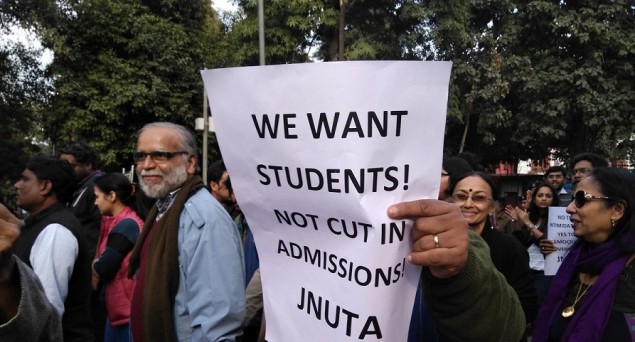IndiaTomorrow.net,
New Delhi, April 25: In an interim relief to the students protesting against massive cut in seats in research programs like MPhil and PhD, the Delhi High Court on Tuesday stayed the order of its own one-judge bench that had upheld the new admission policy that Jawaharlal Nehru University adopted from this academic year following the UGC regulation 2016.
In March this year, the one-judge bench of the court had dismissed the plea by some students challenging the new JNU admission policy saying the UGC guidelines for MPhil and PhD courses are binding on all varsities.
However, according to PTI news agency, a two-judge bench of the same court comprising Acting Chief Justice Gita Mittal and Justice Anu Malhotra today stayed “the effect and operation of the findings on law” of the single judge till April 28 while hearing an appeal filed by the students.
On April 18, the Delhi High Court had issued notice to the Central government, the UGC and JNU on a plea challenging the UGC notification that put a cap on number of MPhil and PhD research scholars a professor can guide.
The plea filed by the CPI-M-affiliated Students’ Federation of India (SFI) and some aspiring M.Phil and Ph.D students of JNU and Delhi University challenged the constitutional validity of the UGC (Minimum Standards and Procedure for Award of M.Phil and Ph.D degree) Regulations 2016 which came into effect from July 5, 2016.
They have contended that the UGC notification “threatens to put their future in jeopardy” as they would not be able to find research supervisors/guides due to the said notification.
The SFI and students argued that the notification’s ramifications will extend beyond existing researchers and lead to few admissions of research aspirants in the current academic session.
Compared to 970 seats in the last academic year for these two degrees, this year the number of seats has dropped to 102 due to capping of the number of students per research supervisor for M.Phil and Ph.D courses, said the plea.
The admission regulations were contrary to the Fundamental Rights and the Directive Principles of State Policy, said the plea terming regulations as “irrational, unreasonable and arbitrary”.
The petition further argued that the cap was put without consulting or informing students and without improving infrastructure.
It also challenged various provisions of the regulations including those laying down a minimum percentage requirement of 55 per cent for general category and 50 per cent for reserved category as well as the 100 per cent weightage given to viva-voce exam.
The final verdict will come on 28 April.
— With inputs from IANS





